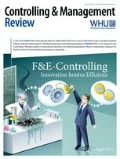






Literatur
Alwert, K. (2005) in http://www.akwissensbilanz.org/Infoservice/Infomaterial/Leitfaden_deutsch.pdf
Baale, O. and Bergholz, W., „Das deutsche Führungsproblem“, Deutscher Taschenbuch Verlag, München, Mai 2005
Becker, H., „Phänomen Toyota, Erfolgsfaktor Ethik“, Springer 2006
Boulter, L, Bendell, T., Abas, H., Dahlgaard, J., Singhal, V., „Report on EFQM and BQF funded study into the impact of the effective implementation of organizational Excellence strategies on key performance results“ University of Leicester, The Center of Quality Excellence, 2005
Conti, T. A., „A history and review of the European Quality Award Model“, The TQM Magazine, Vol. 19 No. 2, 2007, pp. 112 – 128
EFQM 2008: http://www.efqm.org/
Evans, J. R. and Jack, E.P., „Validating Key Results Linkages in the Baldrige Performance Excellence Model“, QMJ VOL. 10, p. 8 (2003)
Falk, A. , Wirtschaftwoche 10.3.2008, p. 54, „Empirische Haltlosigkeit“
Hendricks, K. B., & Singhal, V. R. (2000) „The Impact of Total Quality Management (TQM) on Financial Performance: Evidence from Quality Award Winners“ Quelle: http://www.efqm.org/model_awards/downloads/keyabstract.pdf (23.06.03).
Kaplan, R. S. and Norton, D. P. (1992), „The balanced scorecard: Measures that drive performance“, Harvard Business Review, Vol. 70, No. 1, pp. 71 – 85.
Kaplan, R. S. and Norton, D. P. (1996), The balanced scorecard: Translating strategy into action, Harvard Business School Press, Boston, MA.
Kaplan, R. S. and Norton, D. P. (2000), „Having trouble with your strategy? Then map it“, Harvard Business Review, September-October, pp. 167 – 176
Kaplan, R. S. and Norton, D. P. (2004), „Measuring the strategic readiness of intangible assets“, Harvard Business Review, January-February, pp. 52 – 63
Liker, J. K.,“Der Toyota Weg, 14 Management Prinzipien des weltweit erfolgreichsten Automobilkonzerns: Erfolgsfaktor Qualitätsmanagement“, FinanzBuchverlag 2006
Schmid, W.; „Grundsätze ordnungsgemäßen Controllings – ein Diskussionsanstoß (mit Thesen)“, Controllerkongress München, 2007
Terziovski M., Power D., Sohal A. S., „The longitudinal Effects of the ISO 9000 Certification Process on Business Performance“ – European Journal of Operational Research, Volume 146, pp. 580 – 595 (2003)
Vester, F.; Hesler, A. von (1980): Das Sensitivitätsmodell. Regionale Planungsgemeinschaft Untermain. Umlandverband, Frankfurt.
Vieregge, R., „Qualitätsmanagement im Controlling, Controlling im Qualitätsmanagement“, Controllerkongress München, 2007
Wittmann J. and Bergholz W., „Wert der Bewertung“, Qualität und Zuverlässigkeit Vol. 51, p 38 – 42 (2006)
Danksagung
Der Autor dankt allen Mitgliedern des gemeinsamen Arbeitskreises des icv und der dgq für viele anregende Diskussionen und wertvolle Anregungen, ohne die dieser Beitrag nicht möglich gewesen wäre.
Author information
Authors and Affiliations
Rights and permissions
About this article
Cite this article
Bergholz, W. Operationalisierung von EFQM-basiertem Controlling. Z Control Manag 52 (Suppl 3), 33–40 (2008). https://doi.org/10.1365/s12176-012-0215-y
Published:
Issue Date:
DOI: https://doi.org/10.1365/s12176-012-0215-y

